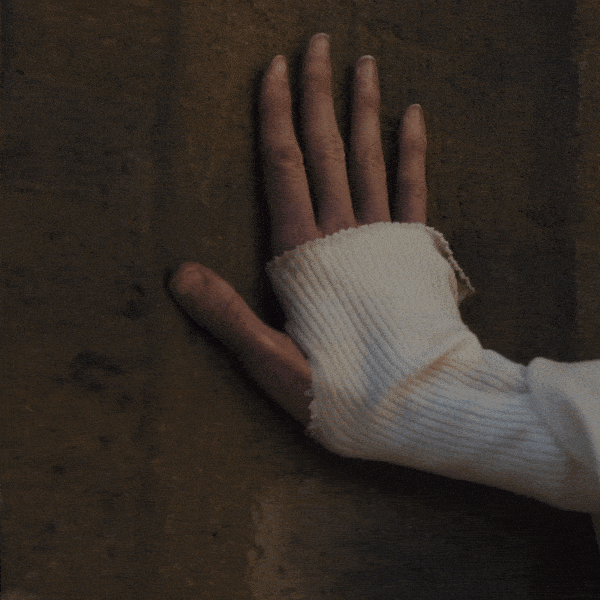Yael Bartana
Malka Germania, 2021
WEB-YBARTANA-.21-0008
The video work Malka Germania, commissioned by the Jewish Museum Berlin, investigates the longing for collective redemption as a response to an age of anxiety. An androgynous messianic figure, Malka...
The video work Malka Germania, commissioned by the Jewish Museum Berlin, investigates the longing for collective redemption as a response to an age of anxiety. An androgynous messianic figure, Malka Germania, arrives in Berlin and brings about a series of changes in the city: the past and future implode into an alternative present.
Malka Germania is Hebrew for “Queen Germania.” The name makes reference to an unusual female designation for the Messiah: “Malka Meshichah,” or the “Annointed Queen.” The Messiah has come to Berlin and thus to the historic epicenter of Jewish, Israeli, and German collective memory. Instead of experiencing immediate redemption, as the exhibition’s title might imply, the city is haunted by its residents’ collective subconscious: their dreams, fears, and memories. The piece portrays subconscious elements, gray areas, and ambiguities of contemporary German-Jewish experience through the artistic medium. At the same time, it attempts to disrupt a fixed iconography and to deconstruct identities.
Bartana leaves the question of who is to be redeemed ambiguous. Perhaps it is people trying to shake off the Nazi past? Or others who want to move on from the trauma of the Holocaust? Or does she mean all humankind as the beneficiaries of a messianic age? The commissioned work shows how impossible it is to break away from personal or inherited pasts. At the same time, it preserves the tension of redemption, which is a core element of national myths and collective identities.
Beyond the video installation itself, Bartana adds another layer of public engagement with savior figures. A vitrine cabinet recessed in the video wall reveals a collection of statuettes of Malka Germania with an eagle. Resembling a museum storage facility, this display raises the prospect of Malka being historicized and commercialized as a cultural icon. The association between the savior figure and the national symbol combines religious expectations with political ones. The liberation of the eagle by the Messiah, as depicted on the exhibition poster, stands allegorically for the moment of redemption.
Malka Germania is Hebrew for “Queen Germania.” The name makes reference to an unusual female designation for the Messiah: “Malka Meshichah,” or the “Annointed Queen.” The Messiah has come to Berlin and thus to the historic epicenter of Jewish, Israeli, and German collective memory. Instead of experiencing immediate redemption, as the exhibition’s title might imply, the city is haunted by its residents’ collective subconscious: their dreams, fears, and memories. The piece portrays subconscious elements, gray areas, and ambiguities of contemporary German-Jewish experience through the artistic medium. At the same time, it attempts to disrupt a fixed iconography and to deconstruct identities.
Bartana leaves the question of who is to be redeemed ambiguous. Perhaps it is people trying to shake off the Nazi past? Or others who want to move on from the trauma of the Holocaust? Or does she mean all humankind as the beneficiaries of a messianic age? The commissioned work shows how impossible it is to break away from personal or inherited pasts. At the same time, it preserves the tension of redemption, which is a core element of national myths and collective identities.
Beyond the video installation itself, Bartana adds another layer of public engagement with savior figures. A vitrine cabinet recessed in the video wall reveals a collection of statuettes of Malka Germania with an eagle. Resembling a museum storage facility, this display raises the prospect of Malka being historicized and commercialized as a cultural icon. The association between the savior figure and the national symbol combines religious expectations with political ones. The liberation of the eagle by the Messiah, as depicted on the exhibition poster, stands allegorically for the moment of redemption.
Exhibitions
Yael Bartana Redemption Now, Jewish Museum Berlin, June 4 - October 10, 2021Literature
Nikki Shaner-Bradford, Elenore Condo, Gisela Williams, and Alwa Cooper, “The T List: Five Things We Recommend This Week,” The New York Times Style Magazine, August 5, 2021 (ill.).Shany Littman, “Israeli Artist Who Filmed IDF Soldiers Occupying Berlin Can’t Imagine Living in Israel,” Haaretz, July 27, 2021 (ill.).
Boaz levin, “Yael Bartana on the Politics of Collective Redemption,” Frieze, July 21, 2021 (ill.).
Sonja Zekri, "Und erlöse uns von der Geschichte," Süddeutsche Zeitung, July 1, 2021 (ill.).
Daniel Horn, “Interviews: Yael Bartana on Messianic Myth, Redemption, and the ‘Jewish Question,’” Artforum, June 30, 2021 (ill.).
Andreas Kilb, "Eine unverzeihliche historische Naivitat," Frankfurter Allgemeine Zeitung, June 14, 2021 (ill.).
Torsten Landsberg, “The search for Redemption: Yael Bartana at the Jewish Museum,” Deutsche Welle, June 10, 2021 (ill.).
Jewish Museum Berlin, “Redemption at Last: Yael Bartana’s Solo Exhibition Opens at the Jewish Museum Berlin,” Hyperallergic, June 7, 2021 (ill.).
“Zur Eröffnug komt der Messias,” Der Tagesspiegel, June 4, 2021 (ill.).
Elke Buhr, “Erlöse uns!” Monopol, May 2021, pp. 50-60 (ill.).
Gisela Williams, “The T List: Five Things We Recommend This Week,” T: The New York Times Style Magazine, August 5, 2021 (ill.).
Boaz Levin, “What to See in Europe this August,” Frieze, August 4, 2021 (ill.).
Peter Kunitzky, “Yael Bartana: Redemption Now,” Eikon, #115 Fall 2021, pp. 78- 29 (ill.).
